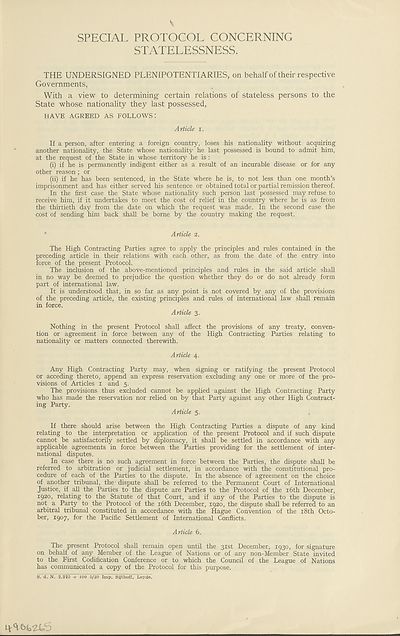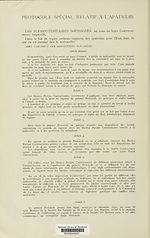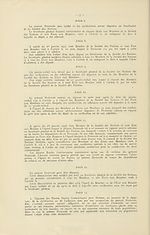Download files
Complete book:
Individual page:
Thumbnail gallery: Grid view | List view

SPECIAL PROTOCOL CONCERNING
STATELESSNESS.
THE UNDERSIGNED PLENIPOTENTIARIES, on behalf of their respective
Governments,
With a view to determining certain relations of stateless persons to the
State whose nationality they last possessed,
HAVE AGREED AS FOLLOWS:
Article i.
If a person, after entering a foreign country, loses his nationality without acquiring
another nationality, the State whose nationality he last possessed is bound to admit him,
at the request of the State in whose territory he is :
(i) if he is permanently indigent either as a result of an incurable disease or for any
other reason ; or
(ii) if he has been sentenced, in the State where he is, to not less than one month's
imprisonment and has either served his sentence or obtained total or partial remission thereof.
In the first case the State whose nationality such person last possessed may refuse to
receive him, if it undertakes to meet the cost of relief in the country where he is as from
the thirtieth day from the date on which the request was made. In the second case the
cost of sending him back shall be borne by the country making the request.
Article 2.
The High Contracting Parties agree to apply the principles and rules contained in the
preceding article in their relations with each other, as from the date of the entry into
force of the present Protocol.
The inclusion of the above-mentioned principles and rules in the said article shall
in no way be deemed to prejudice the question whether they do or do not already form
part of international law.
It is understood that, in so far as any point is not covered by any of the provisions
of the preceding article, the existing principles and rules of international law shall remain
in force.
Article 3.
Nothing in the present Protocol shall affect the provisions of any treaty, conven¬
tion or agreement in force between any of the High Contracting Parties relating to
nationality or matters connected therewith.
Article 4.
Any High Contracting Party may, when signing or ratifying the present Protocol
or acceding thereto, append an express reservation excluding any one or more of the pro¬
visions of Articles 1 and 5.
The provisions thus excluded cannot be applied against the High Contracting Party
who has made the reservation nor relied on by that Party against any other High Contract¬
ing Party.
Article 5. ,
If there should arise between the High Contracting Parties a dispute of any kind
relating to the interpretation or application of the present Protocol and if such dispute
cannot be satisfactorily settled by diplomacy, it shall be settled in accordance with any
applicable agreements in force between the Parties providing for the settlement of inter¬
national disputes.
In case there is no such agreement in force between the Parties, the dispute shall be
referred to arbitration or judicial settlement, in accordance with the constitutional pro¬
cedure of each of the Parties to the dispute. In the absence of agreement on the choice
of another tribunal, the - dispute shall be referred to the Permanent Court of International
Justice, if all the Parties to the dispute are Parties to the Protocol of the 16th December,
1920, relating to the Statute of that Court, and if any of the Parties to the dispute is
not a Party to the Protocol of the 16th December, 1920, the dispute shall be referred to an
arbitral tribunal constituted in accordance with the Hague Convention of the 18th Octo¬
ber, 1907, for the Pacific Settlement of International Conflicts.
Article 6.
The present Protocol shall remain open until the 31st December, 1930, for signature
on behalf of any Member of the League of Nations or of any non-Member State invited
to the First Codification Conference or to which the Council of the League of Nations
has communicated a copy of the Protocol for this purpose.
S. d. N. 2.225 + 100 5/30 Imp. Sijthoff, Leyde.
STATELESSNESS.
THE UNDERSIGNED PLENIPOTENTIARIES, on behalf of their respective
Governments,
With a view to determining certain relations of stateless persons to the
State whose nationality they last possessed,
HAVE AGREED AS FOLLOWS:
Article i.
If a person, after entering a foreign country, loses his nationality without acquiring
another nationality, the State whose nationality he last possessed is bound to admit him,
at the request of the State in whose territory he is :
(i) if he is permanently indigent either as a result of an incurable disease or for any
other reason ; or
(ii) if he has been sentenced, in the State where he is, to not less than one month's
imprisonment and has either served his sentence or obtained total or partial remission thereof.
In the first case the State whose nationality such person last possessed may refuse to
receive him, if it undertakes to meet the cost of relief in the country where he is as from
the thirtieth day from the date on which the request was made. In the second case the
cost of sending him back shall be borne by the country making the request.
Article 2.
The High Contracting Parties agree to apply the principles and rules contained in the
preceding article in their relations with each other, as from the date of the entry into
force of the present Protocol.
The inclusion of the above-mentioned principles and rules in the said article shall
in no way be deemed to prejudice the question whether they do or do not already form
part of international law.
It is understood that, in so far as any point is not covered by any of the provisions
of the preceding article, the existing principles and rules of international law shall remain
in force.
Article 3.
Nothing in the present Protocol shall affect the provisions of any treaty, conven¬
tion or agreement in force between any of the High Contracting Parties relating to
nationality or matters connected therewith.
Article 4.
Any High Contracting Party may, when signing or ratifying the present Protocol
or acceding thereto, append an express reservation excluding any one or more of the pro¬
visions of Articles 1 and 5.
The provisions thus excluded cannot be applied against the High Contracting Party
who has made the reservation nor relied on by that Party against any other High Contract¬
ing Party.
Article 5. ,
If there should arise between the High Contracting Parties a dispute of any kind
relating to the interpretation or application of the present Protocol and if such dispute
cannot be satisfactorily settled by diplomacy, it shall be settled in accordance with any
applicable agreements in force between the Parties providing for the settlement of inter¬
national disputes.
In case there is no such agreement in force between the Parties, the dispute shall be
referred to arbitration or judicial settlement, in accordance with the constitutional pro¬
cedure of each of the Parties to the dispute. In the absence of agreement on the choice
of another tribunal, the - dispute shall be referred to the Permanent Court of International
Justice, if all the Parties to the dispute are Parties to the Protocol of the 16th December,
1920, relating to the Statute of that Court, and if any of the Parties to the dispute is
not a Party to the Protocol of the 16th December, 1920, the dispute shall be referred to an
arbitral tribunal constituted in accordance with the Hague Convention of the 18th Octo¬
ber, 1907, for the Pacific Settlement of International Conflicts.
Article 6.
The present Protocol shall remain open until the 31st December, 1930, for signature
on behalf of any Member of the League of Nations or of any non-Member State invited
to the First Codification Conference or to which the Council of the League of Nations
has communicated a copy of the Protocol for this purpose.
S. d. N. 2.225 + 100 5/30 Imp. Sijthoff, Leyde.
Set display mode to:
![]() Universal Viewer |
Universal Viewer | ![]() Mirador |
Large image | Transcription
Mirador |
Large image | Transcription
Images and transcriptions on this page, including medium image downloads, may be used under the Creative Commons Attribution 4.0 International Licence unless otherwise stated. ![]()
| League of Nations > Legal > Protocole spécial relatif à l'apatridie > (3) |
|---|
| Permanent URL | https://digital.nls.uk/191513609 |
|---|
| Shelfmark | LN.V |
|---|
| Description | Over 1,200 documents from the non-political organs of the League of Nations that dealt with health, disarmament, economic and financial matters for the duration of the League (1919-1945). Also online are statistical bulletins, essential facts, and an overview of the League by the first Secretary General, Sir Eric Drummond. These items are part of the Official Publications collection at the National Library of Scotland. |
|---|---|
| Additional NLS resources: |
|

